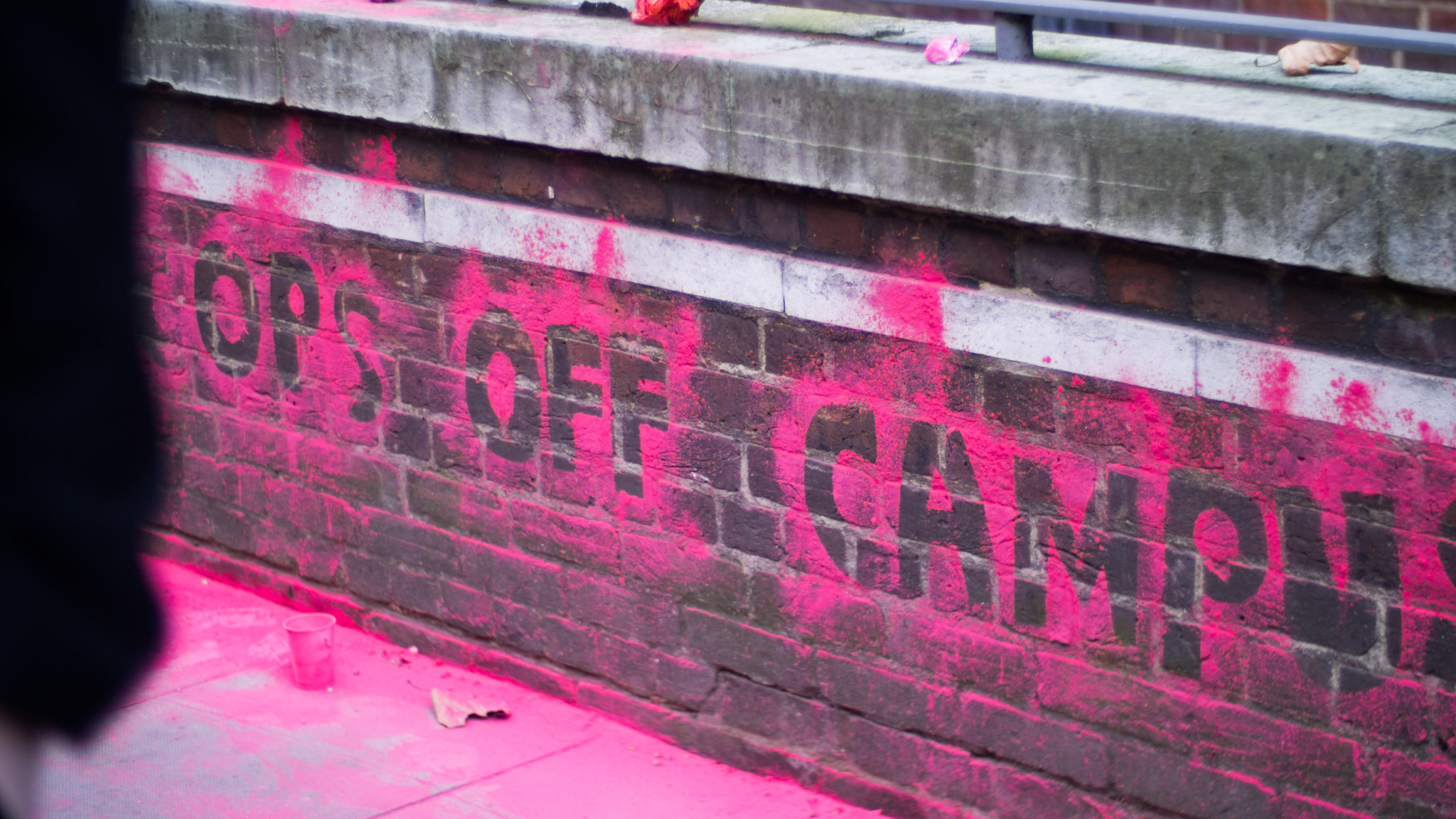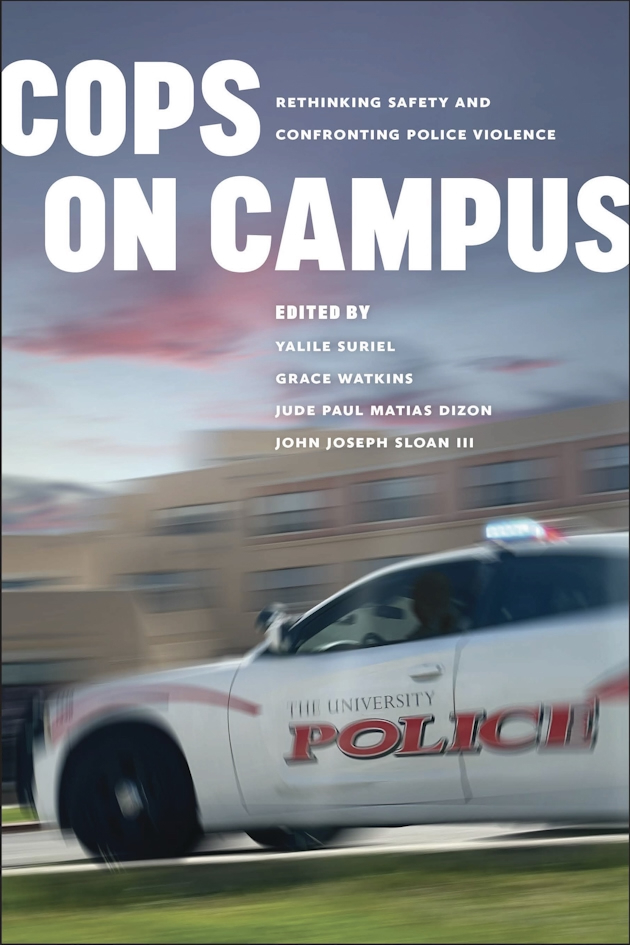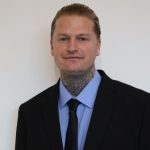Ryan Flaco Rising is a member of the Underground Scholars Initiative (USI), which supports formerly incarcerated and system-impacted students within the University of California system. In this interview conducted by the editors of Cops on Campus: Rethinking Safety and Confronting Police Violence, he discusses his own experiences and observations of the effect that pervasive campus policing has on formerly incarcerated students. Students with direct experience of the criminal legal system have specific and often-unaddressed needs within higher education and are targeted by campus police, which presents particular challenges for students on probation or parole. He also reflects on the aims, objectives, and challenges facing the statewide movement to support system-impacted students and the Cops Off Campus Movement. The interview has been edited for length and clarity.
Can you tell us a bit about yourself and your early experiences?
I’m a formerly incarcerated student, part of the Gaucho Underground Scholars program here at the University of California, Santa Barbara (UCSB). I’m finishing up my bachelor’s degree in sociology with a minor in education, and I was accepted as a PhD candidate into UC Irvine within the Criminology, Law, and Society department.
My background is that I went through the school-to-prison pipeline starting at the age of six. Like many other kids coming from marginalized communities, school officials and health professionals mistreated me. By the age of twelve, I was incarcerated as a juvenile. This was the start of a very dark path where my spirit was broken. I was totally dehumanized by the humiliation that I experienced in juvenile hall at the hands of the staff members. Then sent back out to my community broken internally and dealing with an institutionalized mindset where I didn’t respect my community any longer because of the way I was being treated as a little kid. I had a very poor education due to this. I didn’t know how to write with periods or commas. I didn’t know my times tables. I didn’t know how to really be a student. I wasn’t trained on it. I was pretty much used and pushed through education.
After being incarcerated as a youth, I found myself incarcerated as an adult in the county jail. I did seven years in the California Department of Corruption. I was a part of the 2011–13 prisoner hunger strikes to demand rehabilitative services. One major success of these strikes was that the prison ended the use of indeterminate segregated housing units, where they were housing many of our elders. Another was that the prison began offering college courses. I began to study at Lassen Community College and I felt amazing. It was the biggest accomplishment of my life thus far to get A+ grades, so I kept studying. Then got released on August 12, 2015.
Like most people, I didn’t have any family connections, because I had been isolated from my family for so long, so I was transient and houseless. I was released to the streets and slept my first night out of prison on a bench in front of San Diego City College. When I woke up the next morning, I looked at the college sign and said to myself, “I’m going to go to college here.” With support from my parole officer and reconnecting with my mom, I got signed up for college.
What were your experiences like with campus police once you got to college?
In my view, any school that has a police department attached to it is invested in the school-to-prison pipeline. At San Diego City College, it was disgusting how much the police control that campus. They were ticketing everyone for the smallest parking violations and harassing folks that were living on the street even though they really respected the campus. I’m tatted up so it was hard walking around the streets. The police would pull me over and sit me on the curb. They’d ask me, “What gang you from?” Then they would search me and humiliate me in front of my community. This happened on numerous occasions. I’ll never forget this one time I got stopped. The officer was like, “We’ve never seen you here before.” And we’re in a tourist city, so I was looking around and thinking, “Have you seen any of these people?”
There was another incident that really sticks out to me that took place right before I graduated. On campus, I saw a Black man sitting there on his computer, minding his own business when two officers jumped out. When they grabbed the guy he passed out. The way they picked him up caused his head to start hitting the concrete. I began filming and telling the officers to leave him alone. They told me that they were arresting him for trespassing because he was a transient. My feeling was, even if he was a transient, it doesn’t matter—there are houseless students too. Maybe he was trying to use the Wi-Fi to sign up for classes. How can San Diego City College promote social justice but have police officers patrolling through campus and slamming a man’s head on the concrete? For me, it is a public community college. He had every right to sit there, and he wasn’t bothering anybody.
More from our decarceral brainstorm
Every week, Inquest aims to bring you insights from people thinking through and working for a world without mass incarceration.
Sign up for our newsletter for the latest.
Newsletter
After I graduated, I came up to UC Santa Barbara, where there are five different police agencies policing this little twelve-mile radius. And the UCPD [University of California Police Department] has had numerous lawsuits filed against its officers in the past couple of years, including a very serious sexual harassment case filed by a student, but they continue to police the neighborhood. It’s another example of the lack of accountability that exists within these police agencies that are hyperpolicing students.
The university administration responded to my complaint about police harassment by saying that they wanted to introduce all of the formerly incarcerated students on campus to the UCPD so that they would know to not harass us. But they shouldn’t be harassing us period. I told the administration that we’ve worked so damn hard to do the right thing and then are treated like this. I’m studying, I’m writing papers, I’m holding down a 3.94 grade average. And in response my family and I get surveilled and intimidated by campus police on a regular basis. For me, it’s been one of the most humiliating experiences. The UC system gives millions of dollars to its police department that are continuing to cost them even more through lawsuits for misconduct, and yet there’s no funding for formerly incarcerated students and system-impacted students.
That says to me, what are you really invested in? You’re invested in people that work for UCPD to sexually harass and degrade women and make them feel unsafe in this community. But you won’t invest in helping formerly incarcerated students and their families uplift themselves and develop upward mobility and create careers for themselves. You won’t invest in us, but you’ll allow the UCPD to exist. It’s an example of the lack of accountability and the lack of moral compass.
There’s no morality in allowing this police division to exist here anymore. Let it go, shut it down, bring that money back to the students. That way we can build our own connections with one another and develop our own ways to uplift each other instead of having this police station tear us down. They use us as a revenue scheme through aggressive ticketing while continuously pumping students into the school-to-prison pipeline. They pull up and harass people and humiliate them in front of their colleagues.
How would your life change if cops were removed from campus?
As a formerly incarcerated student, I have to set out time in my day to account for frequently being pulled over by the police. If I’m walking on the street, I have to be ready to get pulled over by the police and get questioned. That’s going to take an hour and a half out of my day. So I have to forecast that into my day if I’m going to walk to school. If cops were removed from campus, I wouldn’t have to plan for being stopped by the police and being asked who I am, if I fit a custody description, if I am a gang member. I wouldn’t have to deal with any of that. I would just be able to be myself. Formerly incarcerated students are not here to assimilate whatsoever.
We’re here to prove a point: we are not the monsters that the police make us out to be. If we receive support and opportunities, we shine bright. The Underground Scholars have a 3.56 average GPA and a 100 percent completion rate. We’re creating groundbreaking new research and policies like the Rising-Murrillo Freedom Act, which would automatically expunge people’s records as soon as they receive their bachelor’s degree.
There’s so much that could happen for us as a community if we abolish the police on school campuses. We can be students and not feel like we’re criminals. That’s the way they make us feel with all of this police presence. Everybody walking around this community is treated like a potential suspected criminal, when all I see is a bunch of students.
What are ways that we can all support formerly incarcerated students on campuses across the country?
Join the movement, get involved, advocate for formerly incarcerated students, and help reverse policies that have historically oppressed and criminalized our communities. Let’s start paying people that are coming out of prison who are doing the right things and allow them to flourish and sustain themselves.
Formerly incarcerated people need to know that they belong in college. Just because you’ve made a mistake doesn’t mean that you can’t uplift yourself out of that situation and advocate for something better in the future. You’re not alone. We’re fighting for each other. We need student organizations to unite and fight to end this incarceration epidemic that has destroyed our communities and ransacked marginalized groups and destroyed their lives. Build a committee to dismantle the hyperincarcerating policies that exist in your community. Dismantle and abolish the police system that’s attached to your school. Most of all, challenge the stereotypes of formerly incarcerated people. We’re not monsters; we’re human beings. We’re not gang members; we are human beings. We are not criminals; we are human beings. We’re not what they said. We are your neighbors.
Excerpted from Cops on Campus: Rethinking Safety and Confronting Police Violence. Copyright © 2024 by Yalile Suriel, Grace Watkins, Jude Paul Matias Dizon, and John Joseph Sloan III. Reprinted with permission from Haymarket Books.
Image: Ella/Flickr


